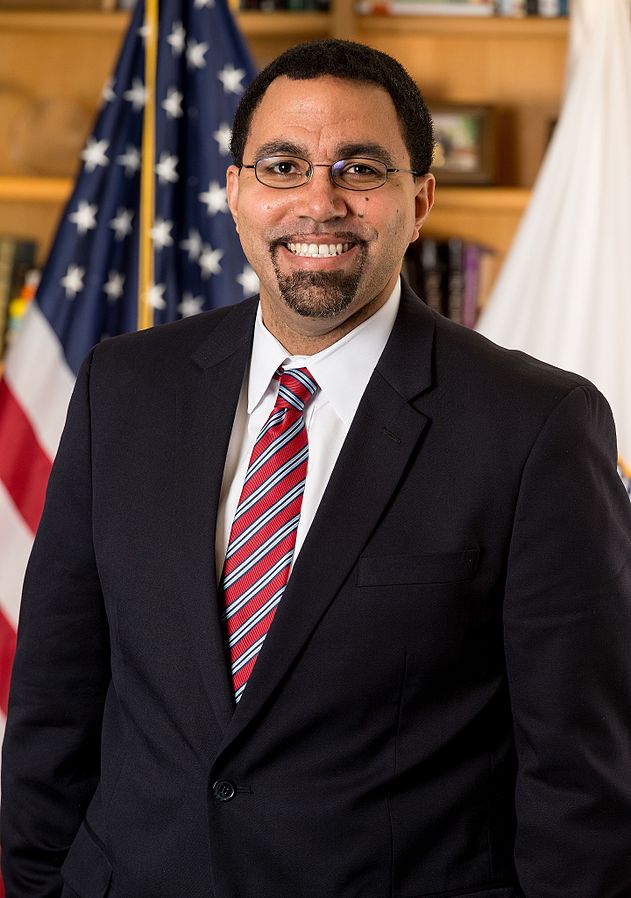
Black History Month
February 01, 2024 Written by Amy Cherry
February is Black History Month – a time to recognize and celebrate Black Americans and their meaningful contributions to our society. At the University of Delaware College of Health Sciences, we’re highlighting contemporary, influential Black figures whose impressive achievements have made a difference in our world. From researchers and academicians to clinicians, community champions, and creators, here are five Black achievers in health sciences you should know.

Ayanna Howard – Researcher
As a young girl, Ayanna MacCalla Howard was fascinated by aliens and robots. The Star Wars fan parlayed her interests in futuristic technology into a career as a roboticist. The entrepreneur and educator garnered international attention in 2008 with the creation of SnoMote robots, which she designed to study the impact of global warming in Antarctica. Years later, she co-founded Zyrobotics, a nonprofit that develops robot toys or games for mobile therapy for children with special needs.
“Rehabilitation often requires a lot of repetition. Robots are really good at that. They don't get bored. Not only that but they can be customized to your individual needs,” Howard told the American Association for the Advancement of Science.
In an interview with Marketplace Tech, she added companion robots could fill the gap left by social distancing due to the COVID-19 pandemic in an
Howard became the first woman to serve as dean at The Ohio State University’s College of Engineering in 2021 and currently serves in the position today.
She’s been named one of the top 100 innovators in the world under the age of 35 by the Massachusetts Institute of Technology’s Technology Review.

John B. King Jr. - Academician
John B. King Jr. is a lifelong educator and policymaker who currently serves as the Chancellor of the State University of New York (SUNY). He is the second Black chancellor of SUNY, the nation’s largest comprehensive university system with more than 60 colleges and universities.
King served as the 10th U.S. Secretary of Education under then-President Barack Obama. King, who was previously acting Deputy Secretary of Education, was confirmed in a vote by the U.S. Senate in 2016. He then became the second African American, the second Latino, and the first Afro-Latino to serve as U.S. Secretary of Education.
During his tenure, King worked to implement the Every Student Succeeds Act and centered federal education policy on increasing student diversity. He focused on improving pre-K-12 outcomes and college completion for students of color, first-generation, and low-income students.
Following his time with the U.S. Department of Education, King became president and CEO of The Education Trust, a national civil rights nonprofit seeking to close achievement gaps for underserved students. The Education Trust also focuses on recruiting and retaining teachers of color, eliminating bias, and dismantling continued racial disparities in public higher education.
King, who also ran for governor in 2022, previously served as New York State Education Commissioner from 2011 to 2014, where he’s credited with developing and implementing a new teach and leader evaluation system, which, for the first time, incorporated student learning growth and brought New York’s education system into compliance with state law. He also piloted a program in New York City to increase diversity among schools through integration.

Keith Black - Clinician
Dr. Keith Black, an internationally renowned neurosurgeon, was a child prodigy.
As a sophomore in high school, he possessed enough surgical proficiency to perform an organ transplant on a dog. By 17, he wrote his first scientific paper on the damage artificial heart valves can do to red blood cells, which won the Award.
Black earned his undergraduate and medical degrees in just six years through an accelerated program at the University of Michigan. He then led UCLA’s Comprehensive Brain Tumor Program for a decade. In 1997, he moved to Cedars-Sinai to become chairman of the Department of Neurosurgery and director of the Maxine Dunitz Neurosurgical Institute. A decade later, he became the founding director of the Johnnie L. Cochran Jr. Brain Tumor Center at Cedars-Sinai. Black is credited with the groundbreaking medical discovery that the naturally occurring peptide bradykinin is effective in opening the blood-brain barrier and led to a thousand-fold increase in the number of chemotherapy drugs reaching brain tumors, according to Newswise. This discovery led to him receiving the Jacob Javits Award from the National Advisory Neurological Disorders and Stroke Council of the National Institutes of Health in June 2000.
According to Cedars-Sinai, Black’s research also focuses on cancer stem cells, microwave tumor ablation, optical-guided surgery for brain tumors, and Alzheimer’s retinal imaging. He also continues to work on developing a vaccine that would enhance the body’s immune response to brain tumors.
Black is known for keeping a hectic surgery schedule. He performs at least 250 brain surgeries annually. By the age of 46, Black had already performed more than 4,000 brain surgeries, operating on many tumors other doctors refused to touch. He was featured on the cover of Time magazine’s “Heroes of Medicine” edition and was listed in Esquire Magazine’s “21 Most Important People of the 21st Century.” In 2001, he received the Essence Award.
In 2009, Black penned his autobiography Brain Surgeon, which examined the racial hurdles he overcame to become a neurosurgeon.

Bryan Stevenson – Community Champion
Bryan Stevenson is an attorney, social justice activist, law professor, and founding executive director of the Equal Justice Initiative. His work centers on challenging racial disparities in the criminal justice system. He’s credited with playing an instrumental role in the U.S. Supreme Court decision that prohibits the sentencing of anyone under the age of 18 to death or life in prison without parole.
Stevenson has roots in Delaware. His mother was an equal opportunity officer at Dover Air Force Base. He graduated from Cape Henlopen High School in 1978. In his younger years, Stevenson attended the historic Prospect African Methodist Episcopal (AME) Church in Georgetown, which he told New York University Law Magazine informed his belief that “each person in our society is more than the worst thing they’ve ever done.”
Stevenson played a crucial role in memorializing America’s dark past. He founded the National Memorial for Peace and Justice on six acres of former public housing land in Montgomery, Alabama, which honors the more than 4,000 African Americans lynched in the South from 1877 to 1950. Stevenson has long argued that lynchings led to disproportionately high mass incarceration rates across the country, according to The New Yorker. The Memorial, which opened in 2018, is dubbed a “sacred space for truth-telling and reflection about racial terrorism and its legacy.”
Stevenson received the American Civil Liberties Union National Medal of Liberty in 2001, with dozens of recognitions following over the years. In 2018, Stevenson received the Benjamin Franklin Award from the American Philosophical Society and the People’s Champion Award at the 44th People’s Choice Awards. In 2020, he also co-received the Right Livelihood Award, the world’s premier award for personal courage and social transformation.

Raven Baxter - Creator
You may know her better as Dr. Raven the Science Maven. Raven Baxter, a molecular biologist and STEM educator, is credited with devising creative ways to get young people excited about science.
Baxter blended her passions for science and inclusivity to found the nonprofit The Science Haven, which aims to make science accessible and engaging to all.
She produced science-education rap videos, including one in response to a controversial tweet by Nicki Minaj about how vaccines work during the COVID-19 pandemic. She also launched a web series called The STEMbassy, which featured scientists of varying genders, races, and disciplines.
In 2021, Baxter, a “self-described fashionista,” launched a clothing line called Smarty Party, which she describes as a place where “fashion meets intelligence.” The clothing line features STEM-themed apparel and accessories, including Periodic Table-themed pants and workout gear, that aim to inspire people passionate about STEM to wear the attire proudly.
In 2020, Baxter was named a “40 Under 40 in Health” by Fortune magazine. In 2021, she was featured on the cover of Reinvented Magazine. In 2022, she was recognized for her viral raps and innovative science communications by Forbes as a “30 Under 30.” She was also labeled a “STEM Trailblazer” that year in Ebony’s Power 100

